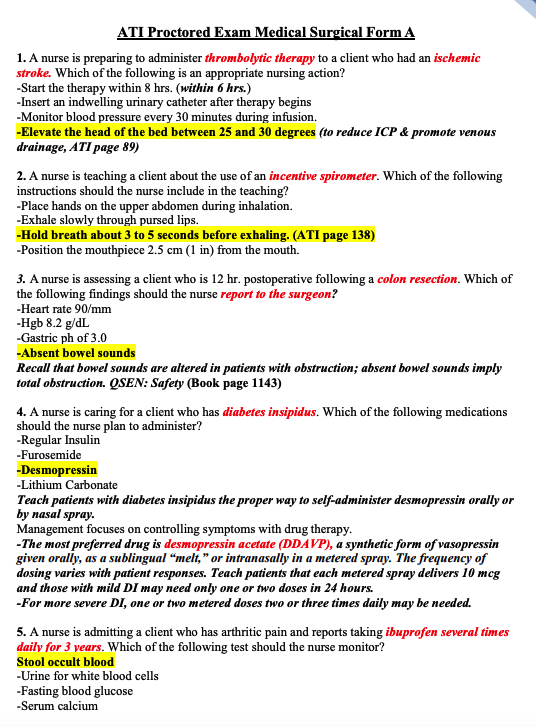ATI Proctored Exam Medical Surgical Form (Grade A)
Summary:
The ATI Proctored Exam Medical Surgical Form A covers various nursing actions and considerations. Thrombolytic therapy for ischemic stroke should be initiated within 6 hours, and monitoring blood pressure during infusion is crucial. Teaching clients about incentive spirometry involves instructions such as holding their breath before exhaling. Postoperative patients following colon resection with absent bowel sounds require reporting to the surgeon. Diabetes insipidus is managed with desmopressin, and long-term ibuprofen users should have stool occult blood monitored. Airborne precautions are necessary for clients with suspected respiratory issues, while breakthrough pain in cancer patients may be managed with transmucosal fentanyl. Analyzing the ST segment helps determine myocardial infarction and proper skin care is essential for those undergoing radiation treatment. Fluid overload after a blood transfusion may require furosemide administration. Magnesium sulphate IV can improve hypoactive bowel sounds. Lumbar puncture is performed with the client in a specific position. ABG results of pH 7.42, PaCO2 30 mm Hg, and HCO3 -21 mEq/L indicate compensated respiratory alkalosis. Withholding metformin is necessary before procedures involving contrast dye. Seizure management in meningitis includes suction equipment and dimmed lights. Wet-to-damp dressing changes utilize mechanical debridement. Toxic shock syndrome presents with a generalized rash. Medications administered via non-tunnelled percutaneous central catheters require sterile gloves. Abnormal NG tube drainage should be reported, and diabetes insipidus is characterized by low urine specific gravity. Cooling blankets aid in thyroid storm management, and acute gout correlates with increased uric acid levels. Peritoneal dialysis requires a clean technique, while burn patients need burned clothing removal. Parkinson’s disease results from decreased dopamine levels. Hyponatremia may require hypotonic IV fluids, and lisinopril can cause a dry cough.
Excerpt:
ATI Proctored Exam Medical Surgical Form
ATI Proctored Exam Medical Surgical Form A
1. A nurse is preparing to administer thrombolytic therapy to a client who had an ischemic stroke. Which of the following is an appropriate nursing action?
-Start the therapy within 8 hrs (within 6 hrs)
-Insert an indwelling urinary catheter after therapy begins
-Monitor blood pressure every 30 minutes during infusion.
-Elevate the head of the bed between 25 and 30 degrees (to reduce ICP & promote venous drainage, ATI page 89)


Reviews